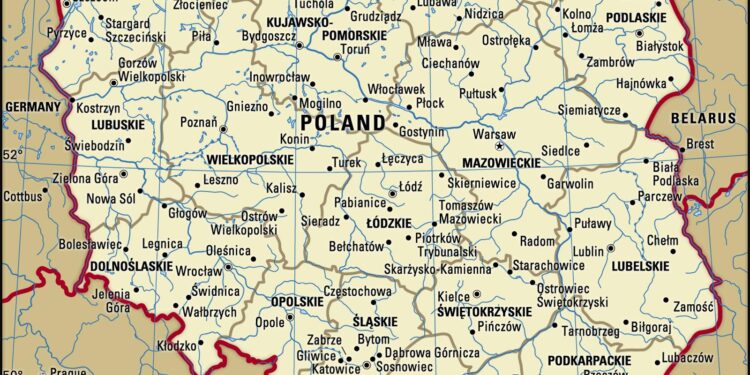Poland Shuts Asylum Door at Belarus Border with EU Backing
In a decisive move that marks a notable shift in immigration policy, Poland has announced the closure of its borders to asylum seekers at the frontier with Belarus, a decision supported by various European Union member states. This development comes amidst increasing tensions along the EU’s eastern border, where the influx of migrants has raised concerns over security and humanitarian obligations. The polish government, citing national security reasons at a time of strained relations with Belarus, asserts that the closure is necessary to bolster its defenses against what it describes as a hybrid threat. This article delves into the implications of Poland’s actions, exploring the broader context of EU asylum policies, the potential impact on migrants, and the challenges ahead as Europe grapples with the ongoing migration crisis.
Poland’s Decision to Seal Asylum Applications at the Belarus Border
In a significant shift in policy, Poland has announced a decision to cease processing asylum applications for individuals arriving at its border with Belarus. This move aligns with the broader strategy of the European Union to reinforce its external borders amidst a growing influx of migrants. The Polish government cites national security concerns and the need to maintain order in the face of what they describe as a hybrid attack facilitated by Belarus. This development has sparked debates about humanitarian obligations and the rights of individuals seeking refuge in Europe.
The decision has garnered support from various EU institutions, which view it as a necessary measure to fortify border security. Key points surrounding this policy change include:
- Security Concerns: Increased tensions with Belarus are prompting fears of a migrant crisis.
- EU Solidarity: Strong backing from EU leaders emphasizes a unified approach to border management.
- Impact on Asylum Seekers: Critics argue that sealing asylum applications could violate international human rights obligations.
As Poland implements this new policy, the implications for asylum seekers remain uncertain. A lack of official channels for submission may lead to increased vulnerability among migrants and raise further questions about the EU’s commitment to the values of protection and asylum.
the Context: Rising Migration Pressures and Regional Security Concerns
The surge in migration along the Poland-Belarus border has escalated tensions within the European Union,prompting significant security concerns. Over the past few years, the region has witnessed a dramatic increase in the number of migrants appearing at its borders, largely driven by geopolitical conflicts, economic instability, and climate change. These factors not only fuel the humanitarian crisis but also prompt fears of national security breaches. To address these mounting pressures, Poland has implemented stringent measures, including the construction of barriers and the tightening of asylum protocols, with backing from the EU. The situation reflects a broader trend where member states prioritize preserved sovereignty and security over humanitarian obligations.
The tightening of asylum policies raises critical questions regarding regional stability and the EU’s collective approach to migration. Key points to consider include:
- Human Rights Concerns: Critics argue that restrictive measures may violate international laws and treaties concerning the treatment of asylum seekers.
- Impact on Neighboring Countries: Increased border enforcement may shift migration flows, putting pressure on other nations like Lithuania and Latvia.
- Political Ramifications: The situation may exacerbate the divide among EU states regarding migration, potentially fueling populist sentiments.
- Long-term Solutions: The need for a cohesive EU-wide strategy to address the root causes of migration is more pressing than ever.
Table 1: Key Migration Statistics (2021-2023)
| Year | Number of Asylum Seekers at Poland-Belarus Border | EU Financial Aid Provided |
|---|---|---|
| 2021 | 50,000 | €200 million |
| 2022 | 40,000 | €150 million |
| 2023 | 30,000 | €100 million |
As the dynamics of migration and border security continue to evolve, the international community must grapple with finding a balanced approach that ensures both humanitarian assistance and national security. The challenges at the Poland-Belarus border serve as a microcosm of larger issues facing Europe, urging a reconsideration of both policy frameworks and the underlying geopolitical landscape.
EU’s Solidarity with Poland: A Unified Response to Border Challenges
The recent decision by Poland to close its borders to asylum seekers at the Belarusian frontier has sparked significant discussions within the European Union, highlighting a unified stance among member states. Poland’s move comes in response to a surge in migration pressures attributed to political unrest in neighboring regions. the EU’s backing for Warsaw serves as a clear message of solidarity, emphasizing the need for collective action in addressing the multifaceted challenges posed by irregular migration. Poland has secured assurances of financial and logistical support from the EU, reinforcing the necessity of border security and the management of incoming migrants.
As part of this strategic response, member states have outlined key measures that focus on both immediate needs and long-term solutions. These include:
- Enhanced Frontex operations: Increasing EU border agency capabilities to assist Poland in managing border security.
- increased funding: Allocating additional resources to support migrant shelters and processing services in Poland.
- joint diplomatic efforts: Collaborating with Belarus to deescalate tensions and address the root causes of migration.
Rather than fostering division,the EU’s response underlines an essential commitment to uphold shared values while simultaneously ensuring security across its borders. Such unity may pave the way for a cohesive migration policy that balances humanitarian concerns with the necessity of maintaining order and legality in border management.
Impact on Asylum Seekers: Humanitarian Implications and Legal Concerns
The recent decision by Poland to close its borders to asylum seekers, particularly along the Belarus frontier, has significant humanitarian implications. Asylum seekers, frequently enough fleeing violence, persecution, and dire economic conditions in their home countries, are left in precarious situations. The move is influenced by the increasing political tensions in the region, which have transformed the border into a complex battleground of geopolitical interests, further complicating the plight of vulnerable individuals. Amidst this backdrop, a range of humanitarian concerns arises, including:
- Increased Vulnerability: Many individuals face harsh conditions, including exposure to the elements and a lack of access to basic needs such as food and healthcare.
- Legal Uncertainty: The new measures create an environment where asylum seekers are denied their legal rights to apply for protection, raising questions about compliance with both national and international laws.
- Psychological Impact: The psychological toll of uncertainty and fear can have profound effects on individuals, particularly children, compounding their trauma.
Moreover, legal concerns are becoming increasingly salient as the situation evolves. Critics argue that the closure of borders contravenes international obligations under the Refugee Convention, which mandates that countries provide asylum seekers the opportunity to apply for refuge.This resistance not only undermines legal frameworks designed to protect the most vulnerable but also poses significant challenges for organizations working in humanitarian and legal advocacy. Key legal challenges emerging from this situation include:
| Legal Concern | Description |
|---|---|
| Non-refoulement | Obligation to not return individuals to countries where they face threats to their life or freedom. |
| Access to Asylum | Restrictions on the ability of individuals to present their asylum claims legally. |
| Human Rights Violations | Potential breaches of human rights norms due to inhumane treatment and detention of migrants. |
border Security Measures: The Role of the EU in Supporting Poland
The increasing influx of migrants at the Poland-Belarus border has prompted not just national but also EU-level interventions aimed at managing this sensitive issue. In response to the ongoing humanitarian crisis, the European Union has backed Poland’s decision to strengthen its border security measures. This support manifests in various forms, such as financial aid, operational assistance, and intelligence-sharing. Key aspects of the EU’s involvement include:
- Fund allocation for border infrastructure: The EU has earmarked funds to enhance fencing and surveillance equipment at the border.
- Joint operations: European agencies, including Frontex, have mobilized resources to assist Polish border guards in managing the situation effectively.
- diplomatic pressure: The EU has engaged in dialogue with Belarus, attempting to address the political conditions contributing to the migration crisis.
While the measures have been portrayed as necessary for national security, they have sparked a broader discourse about human rights and the right to asylum within Europe. Critics argue that the EU’s backing effectively legitimizes Poland’s decision to close its borders, risking the safety of vulnerable individuals fleeing conflict or persecution. Moreover, the legal and ethical implications of this stance can be encapsulated in a few key points:
| Aspect | Details |
|---|---|
| Human Rights Concerns | Closure of asylum channels may violate commitments to offer refuge. |
| Political Implications | Potential strain on EU solidarity, particularly among member states with differing views on migration. |
| Security vs. Humanity | The balance between border security and humane treatment of migrants is increasingly precarious. |
regional Dynamics: How Poland’s Actions Affect Relations with Belarus
Poland’s recent decision to close its borders to asylum seekers from Belarus has elicited a complex response that reverberates through the region.This action,backed by EU policy,signals a significant shift in how Eastern European nations manage migration and border security,especially in relation to Belarus,a country frequently enough criticized for its authoritarian regime. By tightening asylum protocols, Poland aims to fortify its borders against irregular migration, which it links to hybrid threats orchestrated by the belarusian government. The Polish government contends this approach is essential for maintaining national security and sovereignty in a geopolitical landscape characterized by tension and uncertainty.
Moreover, this border policy not only impacts refugees but also affects diplomatic relations with Belarus, potentially exacerbating existing tensions. By *restricting movement* and enforcing strict asylum rules, Poland sends a message of resistance against Belarusian maneuvers perceived as attempts to destabilize the region. This can lead to a series of reactions from Belarus, possibly including retaliatory measures that might further complicate the already strained bilateral relations. The implications of Poland’s approach can be categorized in a few key areas:
- Security Concerns: Increased military presence at the border to deter threats.
- Humanitarian Impact: Challenges faced by vulnerable populations seeking asylum.
- Regional Stability: A potential escalation of conflict in Eastern Europe.
International Human Rights Perspective: Evaluating Poland’s Asylum Policy
The recent decision by Poland to tighten its asylum policies at the border with Belarus raises critical questions under international human rights standards. This move not only reflects a national stance but also aligns with broader EU strategies aiming to control migration flows. By implementing stringent border measures, Poland is prioritizing national security while potentially undermining the essential rights of vulnerable populations seeking asylum. Human rights organizations have expressed deep concerns regarding the implications of such policies on individuals fleeing conflict, persecution, and dire humanitarian crises.
To evaluate the impact of Poland’s asylum policy, consider the following factors:
- International Law Compliance: Assessing adherence to the 1951 Refugee Convention.
- Humanitarian Access: Analyzing the challenges faced by NGOs and aid organizations in providing support.
- Protection of Vulnerable Groups: Special attention to women, children, and marginalized communities.
| Key Concerns | Potential Consequences |
|---|---|
| Forced Returns | Risk of refoulement and exposure to danger |
| Lack of Asylum Procedures | Denial of legal rights and protection |
| Border Violence | Human rights violations reported by migrants |
As Poland maintains its hardened stance on asylum seekers, the EU’s backing raises further ethical dilemmas regarding collective responsibilities toward those in need. It’s critical to scrutinize how these policies resonate with European values of solidarity and protection of human rights. The evolving landscape at the border exemplifies the tensions between state sovereignty and humanitarian imperatives, making it an urgent area for dialogue and reform within both Polish and European frameworks.
Recommendations for Balancing Security and Humanitarian Obligations
As nations grapple with the complexities of border security and the obligation to protect vulnerable populations, it is crucial to adopt a balanced approach that addresses both imperatives. Below are some strategies that could enhance the alignment of security measures with humanitarian obligations:
- Complete Assessment: Conduct detailed analyses to evaluate the potential impacts of border control policies on asylum seekers and refugees, ensuring that decisions are grounded in both security concerns and humanitarian values.
- Engagement with NGOs: Foster partnerships with non-governmental organizations that specialize in refugee support. Their engagement can provide critical insight into the needs of affected populations while strengthening community trust.
- Training for Personnel: Implement training programs for border security personnel that emphasize human rights and the humane treatment of asylum seekers, promoting a culture of respect within enforcement agencies.
- Choice Protection Measures: Explore safe pathways for asylum seekers, such as humanitarian corridors, to allow for secure processing of applicants without compromising national security.
It is indeed essential to foster dialogue between nations regarding common challenges at the borders while prioritizing a humanitarian response.Establishing a framework for collaboration that ensures the protection of human rights, even amidst concerns for security, can lead to sustainable solutions. Consider the following successful practices that could be adopted:
| Practice | Description |
|---|---|
| Shared Intelligence | Countries can share intelligence on human trafficking and smuggling networks, allowing for focused security measures that do not compromise the safety of asylum seekers. |
| Referral Programs | Establish programs that allow asylum seekers to be referred to appropriate services while ensuring their immediate safety and dignity. |
Future of EU Migration Policy: Lessons from the Poland-Belarus situation
The situation at the Poland-Belarus border has highlighted significant challenges regarding the EU’s approach to migration and asylum policies.Poland’s decision to strengthen border controls and deny asylum seekers entry reflects not only national priorities but also a shift in EU dynamics where member states are increasingly inclined toward unilateral solutions. These developments raise critical questions about the future of solidarity among EU nations, particularly in managing migration crises. Key lessons include:
- Cooperation vs. Isolation: Countries may prioritize national security over collective responsibility,prompting a re-evaluation of the Dublin Regulation.
- Human Rights Concerns: The treatment of migrants and asylum seekers at borders must remain a central issue, necessitating safeguards against pushbacks and detention.
- Regional Solutions: Increased collaboration with non-EU countries for border management and refugee support may be necessary to address migratory pressures effectively.
Moreover, the Poland-Belarus situation underscores the need for a cohesive yet flexible migration framework that accommodates the diverse interests of member states while adhering to EU principles. The imperative for a more comprehensive and sustainable approach is evident,as many nations grapple with populist sentiments that challenge established norms. A proposed pathway forward could include:
| Policy Advice | Description |
|---|---|
| Enhanced Border Management | Invest in technology and personnel to secure borders while streamlining asylum processing. |
| Asylum System Reform | Revise existing regulations to ensure fair and efficient processing across member states. |
| International Cooperation | Engage with third countries to create partnerships that support refugee assistance and resettlement. |
Public Opinion in Poland: The Political Landscape Surrounding Asylum Issues
The recent crackdown on asylum seekers at the Belarus-Poland border has ignited a polarizing debate within Polish society.Many citizens express fear and concern over the influx of migrants, driven by the perception that there is a direct correlation between asylum seekers and national security risks. Public sentiment has increasingly leaned towards supporting strict border control measures, particularly amid rising political rhetoric that emphasizes sovereignty and national identity. Key factors influencing public opinion include:
- Media Portrayals: Sensationalized reporting often frames migrants negatively, influencing public perceptions.
- Government Messaging: The ruling authority has maintained a strong anti-asylum narrative, further swaying opinions.
- Social Media Impact: Misinformation and echo chambers amplify fear and hostility towards refugees.
Conversely, a segment of the population advocates for a more humane approach to asylum issues, arguing that Poland has a moral obligation to assist those fleeing persecution. Human rights organizations and various civic groups are mobilizing campaigns to raise awareness and garner support for asylum seekers. Their arguments often highlight:
- International Obligations: poland’s responsibilities under international asylum agreements.
- Human Rights Advocacy: The ethical imperative to protect vulnerable populations.
- Past Context: Poland’s own history of migration and refugee crises.
Wrapping Up
Poland’s decision to tighten its borders and limit asylum applications at the Belarus frontier marks a significant shift in the European approach to migration and border security.Backed by the EU, this move reflects a growing emphasis on curbing irregular migration and managing the pressures stemming from geopolitical tensions in the region. As the situation continues to unfold,the implications for asylum seekers,human rights,and the broader European asylum framework remain critical areas to monitor. The outcomes of this policy will not only shape the experiences of those seeking refuge but also influence the future of EU solidarity and cooperation in addressing migration challenges. As Europe navigates these complex dynamics, the balance between security and humanitarian responsibility will be pivotal in determining the continent’s response to ongoing crises.
















